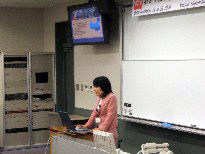The Knowledge Transfer of Global Retailer:
The Case of Wal-mart
Jin SHI
School of Management, Fudan University,
Shanghai, China
Introduction

Recent years, with the remarkable economy development, China, as a numerous consumption market, is attracting a lot of foreign retailers' attention. But during a long period, the foreign investments had been prohibited to operate in Chinese retail market, and until 1992, the government decided to partially open up its retail market . Since then, a large number of foreign retailers have entered into China. By 1998, the sum has exceeded 200 . On 11th December, 2004, according to the pledge of WTO accession, Chinese retail sector realized its full open to foreign investment . This leads a new boom of foreign retailers' Chinese expansion. Especially some large global retailers, after trials and error over long term, began to launch out their full-dress operations.
Global retailers act a very important role in Chinese retailing development. That because, most of the modern retailing formats (such as convenience store, Hyper-market, home center, and Cash & Carry) were introduced into China by them . In addition, up till now, most of the leading companies in market have been global retailers. Compared with local companies, they have advanced managerial know-how and experienced experts. They diffused the modern retailing technology and know-how in market, and showed demonstration effect to the local retailers. Summarily, it can be said that, it is global retailers that accelerated the modernization of Chinese retail sector.
As well known, at the heart of the foreign retailers' operations lies the application of the stocked knowledge. Their performances in Chinese market largely depend on whether they can complete the knowledge transfer successfully from home country into China. This raises a critical research question: how do the global retailers transfer their knowledge? As known, knowledge transfer is not costless or time consuming, but full of difficulties. The difficulty hinder the knowledge transfer is called "stickiness".
This paper will focus on this issue and explore, in the retailing internationalization process, how the stickiness occurs during the knowledge transfer, and how the global retailers overcome it?
To resolve the questions, we organize this paper as follow: the first, the previous literature review on stickiness of knowledge is to be presented, and then we will analyze what kind of solutions the global retailers would take to overcome the stickiness. Next, a case study is to be used to illustrate our analysis. We will take the case of Wal-mart China to explore its knowledge transfer process, and reveal the issue of its overcoming of stickiness by details. Finally, the conclusion and discussion will be offered
